How Much To Budget For Rewiring a 1800 sq ft Home?
Budgeting for rewiring a 1,800 square foot home involves considering various factors that can impact the overall cost. On average, homeowners can expect to budget between $4,000 and $18,000 for rewiring a home of this size. The total cost depends on factors such as the existing wiring condition, the complexity of the electrical system, the materials used, and labor rates in your area. Basic rewiring projects with standard materials may cost around $4,000 to $8,000, while more extensive projects with premium materials and customization could range from $8,000 to $18,000 or more.
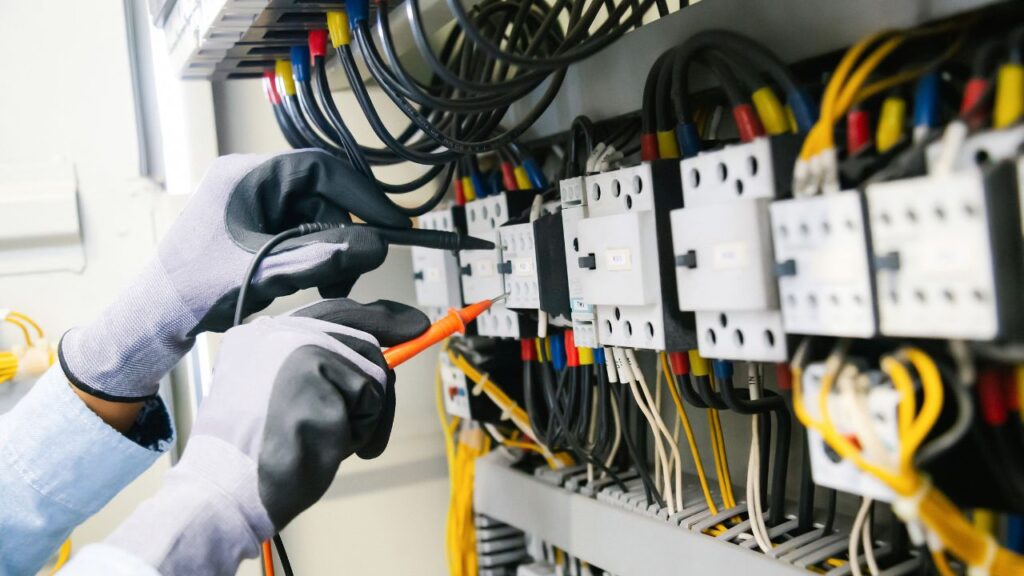
It’s recommended to obtain quotes from licensed electricians to determine an accurate budget based on your specific requirements and preferences.
Electrical Outlet Price by Type
There’s a whole bunch of electrical outlets out there, all different shapes and sizes, and they can cost you anywhere from a buck to 80 bucks. You’ve got to pick the right one for what you’re plugging in, or you could end up with a broken appliance or even a fire. And watch out – using the wrong outlet might mess up your warranty too. Oh, and those plugs with different numbers of prongs? Make sure you’ve got the right number of holes for ’em.
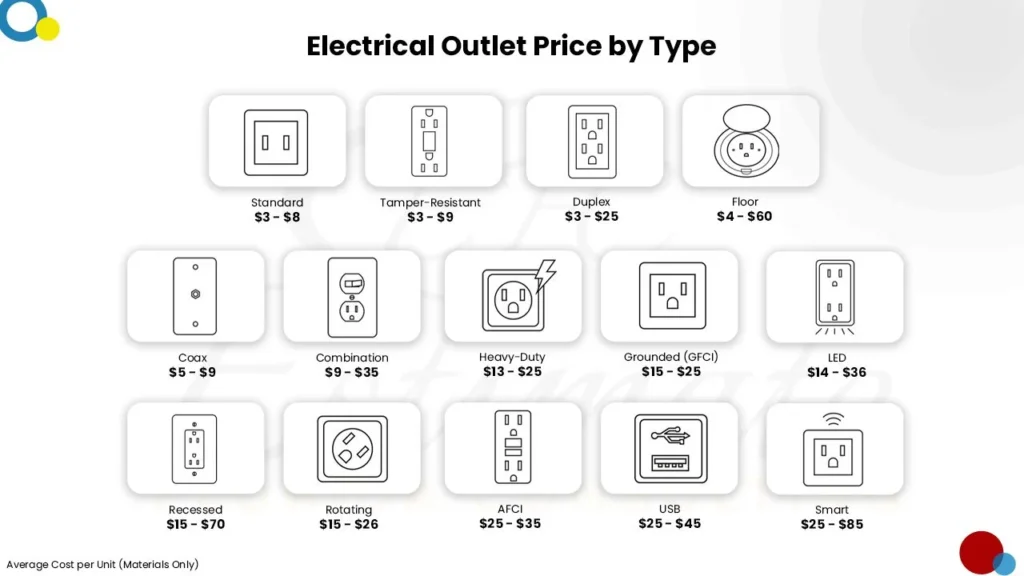
| Type | Average Cost per Unit (Materials Only) |
|---|---|
| Standard | $3 – $8 |
| Tamper-Resistant | $3 – $9 |
| Duplex | $3 – $25 |
| Floor | $4 – $60 |
| Coax | $5 – $9 |
| Combination | $9 – $35 |
| Heavy-Duty | $13 – $25 |
| Grounded (GFCI) | $15 – $25 |
| LED | $14 – $36 |
| Recessed | $15 – $70 |
| Rotating | $15 – $26 |
| AFCI | $25 – $35 |
| USB | $25 – $45 |
| Smart | $25 – $85 |
Hire Professional Contractors
Why Do Homes Need Rewiring?
Homes may require rewiring due to outdated or faulty electrical systems, safety concerns, renovation projects, or the need to upgrade to meet current electrical standards.
Outdated wiring in homes poses serious safety hazards such as electrical fires and shock risks. As technology advances and electrical demands increase, older systems may struggle to keep up, leading to potential dangers. Renovation projects often reveal the limitations of existing electrical infrastructure, prompting the need for rewiring to support modern appliances and devices. Ensuring a reliable electrical system is crucial to prevent disruptions and protect against power surges that can damage electronics. By rewiring, homeowners can address these issues, enhance safety, and improve the overall functionality of their homes.
How To Determine If A Home Needs Rewiring?
Assessing whether a home needs rewiring involves considering factors such as the age of the property, the frequency of electrical issues, the type of wiring used, and the presence of aluminum wiring.
Inspecting the electrical system for visible signs of wear and tear, such as exposed wires, flickering lights, or frequent tripped circuit breakers, is crucial in determining if a rewiring job is necessary. Common electrical problems like overheated outlets, burning smells, or outdated two-prong outlets are red flags that shouldn’t be ignored.
Evaluating the quality of existing wiring by checking if it meets current safety standards and assessing the material used can provide insight into the overall condition of the electrical setup. Recognizing the risks associated with aluminum wiring, such as potential fire hazards due to its susceptibility to corrosion and overheating, underscores the importance of proactive rewiring when needed.
Age Of The Home
The age of a home is a crucial factor in determining the need for rewiring, as older properties may have outdated wiring that poses safety risks and fails to meet modern electrical standards.
Over time, electrical wiring deteriorates due to wear and tear, potentially leading to frayed insulation, exposed wires, and overloaded circuits. These aging systems can increase the risk of electrical fires and electrical shocks.
As electrical standards have evolved to accommodate the growing energy demands and ensure safer installations, older homes may not be up to par.

Upgrading the wiring in older properties not only enhances safety but also brings them in line with current building codes, improving the overall value and functionality of the home.
Frequency Of Electrical Issues
Frequent electrical problems such as tripping circuit breakers, flickering lights, or malfunctioning outlets may indicate underlying wiring issues that require attention through a rewiring project.
These issues are not just minor inconveniences; they can be warning signs of potential safety hazards if left unaddressed. For instance, flickering lights could be a sign of loose connections in the wiring, which may lead to overheating and pose a fire risk. Similarly, outlets that spark or feel warm to the touch could indicate overloaded circuits or faulty wiring.
Being vigilant and proactive in addressing these symptoms is crucial to ensuring the safety and reliability of your home’s electrical system.
We Provide 3D Rendering Services!
For Commercial and Residential Building
Turnaround time is 1-2 days
Win More Projects With Us
Type Of Wiring Used
The type of wiring installed in a home influences its safety and performance, with outdated or improper wiring materials necessitating a rewiring project for improved functionality and compliance.
Different wiring materials have varying impacts on the overall efficiency and safety of the electrical system in a home. Outdated or substandard wiring poses significant risks such as electrical fires, shocks, and short circuits.
For instance, older aluminum wiring, commonly found in houses built in the 1960s and 1970s, may be prone to overheating and pose a fire hazard. On the other hand, copper wiring, known for its durability and conductivity, is a safer and more reliable option.
Understanding the characteristics of different wiring types is crucial when considering a home rewiring project to ensure long-term safety and functionality.
Presence Of Aluminum Wiring
Homes with aluminum wiring present a fire hazard and may require rewiring to replace this outdated and unsafe material with copper wiring for enhanced safety and performance.
Aluminum wiring in homes can be a major cause of concern due to its tendency to overheat and increasing the risk of electrical fires. This type of wiring was commonly used in houses constructed during the 1960s and 1970s, but over time, its limitations have become apparent.
To mitigate these dangers and ensure the safety of occupants, it is crucial to transition to copper wiring, known for its superior conductivity and heat resistance. The process of rewiring involves systematically replacing the aluminum wiring with copper, ensuring that proper connections are made to prevent any future electrical issues.
Cost to Replace an Electrical Panel
Replacement of an electrical panel, or electrical circuit breaker, is among the most common projects affecting the electrical wiring in a home. There are many reasons to replace your old model, from a Stab Lok that has a fire risk to experiencing burn marks on your current unit. If the electrical needs have changed, it is possible to upgrade yours when you replace it.
The replacement cost depends on the make and model, amperage, and location:
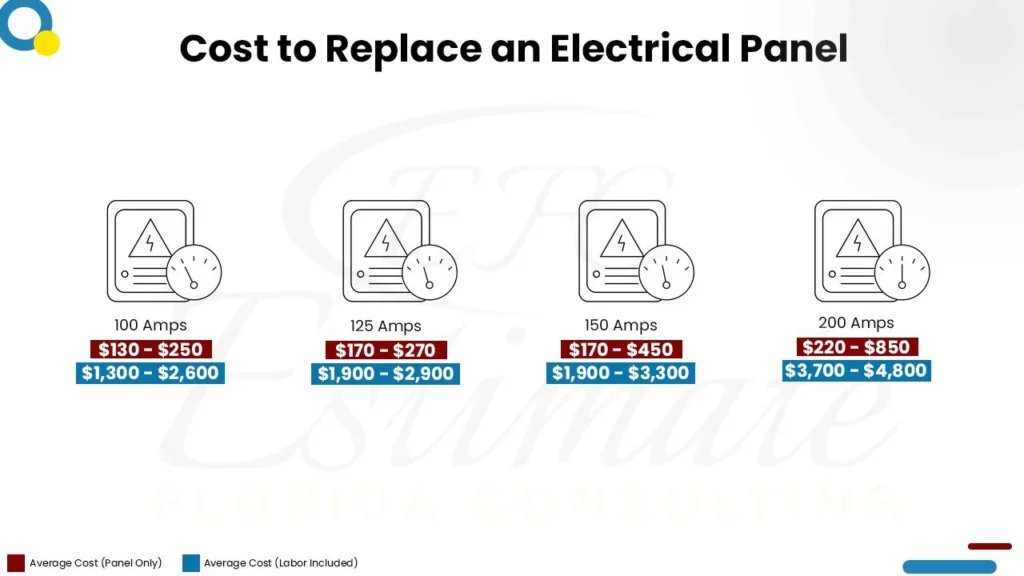
TYPE | AVERAGE COST (PANEL ONLY) | AVERAGE COST (LABOR INCLUDED) |
100 Amps | $130 – $250 | $1,300 – $2,600 |
125 Amps | $170 – $270 | $1,900 – $2,900 |
150 Amps | $170 – $450 | $1,900 – $3,300 |
200 Amps | $220 – $850 | $3,700 – $4,800 |
Business Finance Loan
Find out if you're pre-qualified in seconds

Get Prequalified Now
IMPORTANT: Make sure the email and phone number you enter are correct. We will email and text you a link to get started.
How Much Does It Cost To Rewire A Home?
The cost to rewire a house varies based on factors such as the size of the property, the complexity of the electrical system, the materials used, and the labor required for the project.
For a typical rewiring project in a 1,800 square foot home, homeowners can expect the costs to range from $4,500 to $18,000, depending on the aforementioned variables. Factors like the number of outlets, switches, light fixtures, and the need to upgrade the electrical panel can also impact the overall expense. To obtain accurate cost estimates, it is advisable to consult with licensed electricians or contractors who can assess the specific requirements of the home and provide detailed breakdowns of the costs involved.
Factors That Affect Cost
Various factors influence the cost of a home rewiring project, including the size of the property, the condition of the existing wiring, the accessibility of wiring, and the complexity of the electrical upgrades required.
The size of the property plays a significant role in determining the extent of rewiring needed, with larger homes generally requiring more wiring and labor. For instance, a small apartment may cost less to rewire compared to a sprawling estate.
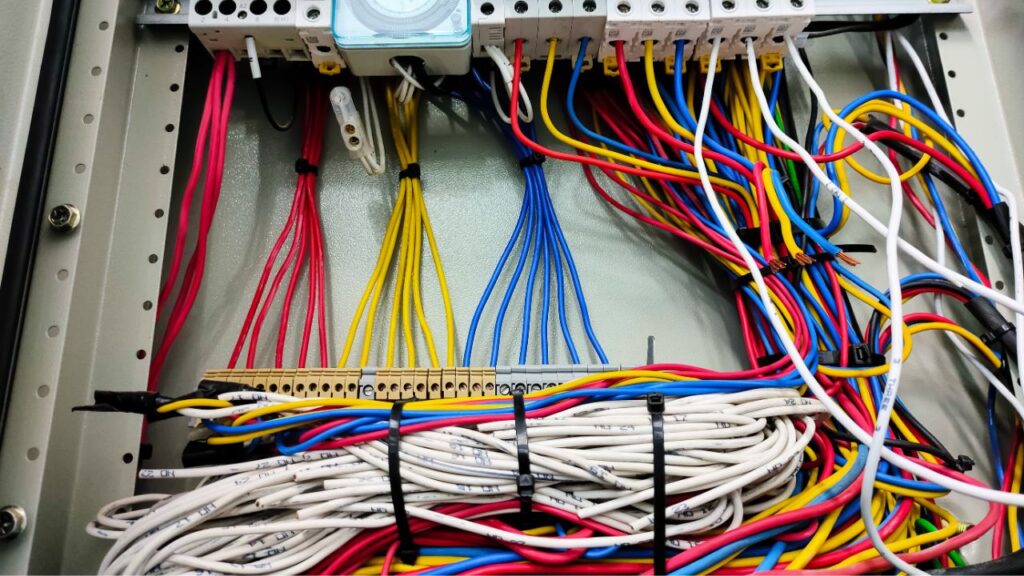
The condition of the existing wiring can impact costs; outdated or damaged wiring may necessitate complete replacement, while well-maintained systems might only need minor adjustments.
Accessibility challenges, such as wiring located behind walls or in hard-to-reach areas, can increase labor costs. The complexity of electrical upgrades, such as installing smart home systems or additional outlets, adds to the overall expense.
Average Cost For A 1,800 Sq Ft Home
The average cost to rewire a 1,800 square foot home typically falls between $4,000 and $10,000. However, the total cost can vary based on several factors, including the home’s age, the complexity of the electrical system, the quality of materials used, and labor rates in your area. Basic rewiring projects with standard materials may cost around $4,000 to $6,000, while more extensive projects involving upgrades or customizations could range from $6,000 to $10,000 or more.
What Is The Process Of Rewiring A Home?
The process of rewiring a home typically involves initial inspection and planning, removal of old wiring, installation of new wiring, and final inspection and testing to ensure compliance and safety.
With the initial inspection phase, a qualified electrician will assess the existing wiring to determine its condition and identify any potential hazards or areas that require upgrading.
Following this assessment, a thorough plan will be developed to map out the scope of work, including the specific locations where new wiring will be installed.
Removal of the old wiring then takes place, ensuring that all outdated or faulty components are safely disconnected and removed.
The subsequent installation of new wiring involves precise placement and connection of electrical cables to power outlets, fixtures, and appliances, following the established plan and adhering to electrical codes.
A comprehensive inspection and testing process are conducted to verify that the newly rewired home meets safety standards and functions properly.
Download Template For Rewiring Project Breakdown
- Materials list updated to the zip code
- Fast delivery
- Data base of general contractors and sub-contractors
- Local estimators

Inspection And Planning
The initial phase of home rewiring involves a thorough inspection of the existing wiring, planning the layout of new wiring, and obtaining necessary permits to ensure compliance with local electrical codes.
During the inspection phase, electrical professionals meticulously assess the condition of the current wiring system to identify any issues or safety concerns that need to be addressed. This step is crucial in determining the scope of work required for the rewiring project.
Once the assessment is complete, the next step involves careful planning and designing of the new wiring layout. Blueprints play a key role in guiding the installation process, ensuring that the electrical system is organized and efficient.
Obtaining the required permits not only legalizes the work but also signifies that the rewiring project meets all safety standards and regulations.
Removal Of Old Wiring
Removing outdated or faulty wiring is a fundamental step in the rewiring process, requiring meticulous care to disconnect and extract old electrical components safely and efficiently.
During a rewiring project, the significance of eliminating old wiring goes beyond mere aesthetics. This phase is crucial for ensuring the safety and functionality of the electrical system in a building. Skilled electricians are essential for this task, as they are trained to navigate the complexities of dismantling old wiring systems. Proper disposal methods for old wiring must be followed to prevent environmental contamination. Challenges such as identifying hidden or inaccessible wiring and dealing with potential electrical hazards underscore the need for strict safety protocols during this phase.
Installation Of New Wiring
Installing new wiring involves carefully routing and connecting electrical cables, fixtures, outlets, and circuitry to create a functional and reliable electrical system that meets the property’s power requirements.
During a home rewiring project, it is crucial to understand the intricacies of proper fixture placements and junction box installations.
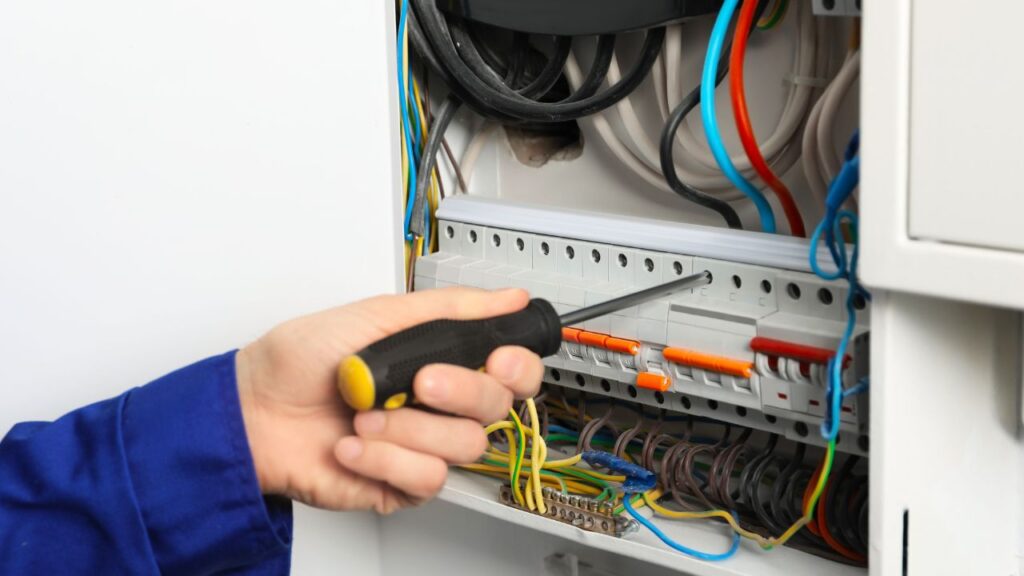
Routing techniques play a vital role in ensuring that the wires are safely installed and concealed within the walls to avoid any hazards.
Connection methods need to be precise and compliant with safety standards to prevent electrical malfunctions or potential fire risks.
Proper labeling of circuits and adherence to local building codes are essential to guarantee a smooth and efficient electrical upgrade process.
Final Inspection And Testing
Conducting a thorough inspection and testing of the rewired electrical system is essential to verify proper installation, compliance with regulations, and safe operation before finalizing the project.
During this critical phase, professional electricians meticulously assess the wiring integrity to ensure there are no loose connections or faulty components that could pose a safety hazard.
They methodically check each circuit to confirm its functionality, examining switches, outlets, and fixtures to guarantee proper power distribution.
A series of tests are conducted to evaluate the overall system performance, including load capacity assessments and surge protection analysis.
By diligently completing these procedures, electricians play a vital role in safeguarding the quality and safety of the newly rewired home.
How Long Does It Take To Rewire A Home?
The duration of a home rewiring project varies based on factors such as property size, wiring complexity, labor availability, and any unforeseen challenges encountered during the installation process.
Typically, a basic rewiring project for an average-sized home could take anywhere from a few days to a couple of weeks to complete, depending on the scope of work involved.
Factors like the number of rooms, the age of the existing wiring, and the need for specialized electrical features can all impact the timeline.
The size of the rewiring team also plays a significant role, as a larger team can divide and conquer tasks more efficiently. Scheduling constraints, such as permits and inspections, might introduce additional time considerations, as well as potential delays due to weather conditions or supply chain issues.
Homeowners can prepare for this timeline by discussing deadlines and expectations with their electrical contractor upfront, ensuring that there is clear communication throughout the project. Setting realistic timelines and being flexible in scheduling can help manage expectations and minimize frustrations during the rewiring process.
Hire Professional Contractors
What Are The Benefits Of Home Rewiring?
Home rewiring offers multiple benefits, including enhanced safety, improved energy efficiency, modernized electrical systems, and increased property value through upgraded wiring and components.
By investing in home rewiring, homeowners can ensure that their living space is up to current safety standards, reducing the risk of electrical fires and hazards.
In addition to safety enhancements, rewiring projects present an opportunity to incorporate energy-saving features such as LED lighting and smart home technologies, leading to lower utility bills and a more environmentally friendly household.
Modernizing electrical systems through rewiring can significantly boost the overall resale value of the property, making it more attractive to potential buyers in a competitive real estate market.
Improved Safety
One of the primary benefits of home rewiring is improved safety, reducing the risk of electrical fires, shocks, and malfunctions associated with outdated or faulty wiring systems.
By upgrading to modern wiring standards and components, homeowners can significantly enhance the safety levels within their living spaces. Properly rewired homes are equipped with circuit breakers that swiftly detect and interrupt electrical surges, preventing devastating fires that could result from overloaded circuits.
Rewiring helps mitigate the risk of electrocution and electrical accidents by ensuring that the wiring is up to code and not prone to shorts or faults. With advancements in technology, rewiring also presents an opportunity to install safer, energy-efficient lighting and electrical fixtures, further reducing the chances of equipment failures or hazardous incidents.
Increased Energy Efficiency
Home rewiring can lead to increased energy efficiency by optimizing power distribution, reducing energy waste, and enabling the use of energy-saving electrical devices and technologies.
This process of rewiring not only enhances the overall electrical system within a home but also plays a crucial role in conserving energy and cutting down on electricity costs.

By strategically planning the layout of electrical circuits and outlets, homeowners can minimize power loss and ensure that electricity is distributed efficiently throughout the house. The integration of energy-efficient appliances further boosts the energy-saving potential of a rewired home, reducing the overall environmental impact and offering long-term financial benefits through lower utility bills.
Modernized Electrical System
Rewiring a home results in a modernized electrical system that accommodates contemporary electrical devices, smart technologies, and advanced safety features, enhancing the overall functionality and convenience of the property.
This transformation not only ensures that homes are equipped to handle the increasing demands of modern technology but also offers a streamlined approach to managing energy consumption. The integration of smart home capabilities allows for remote access and control of various electrical components, providing homeowners with greater convenience and peace of mind. By upgrading to digital controls and enhanced safety mechanisms, individuals can enjoy improved connectivity, energy efficiency, and operational flexibility, ultimately creating a safer and more efficient living environment.
Increased Home Value
By upgrading the electrical system, rewiring projects can increase the overall value of a home, as modern wiring, fixtures, and safety features appeal to buyers and enhance the property’s market worth.
Potential homebuyers often prioritize safety certifications and energy efficiency ratings when considering properties, making homes with updated electrical systems more appealing. Rewired properties not only offer peace of mind in terms of safety but also present a competitive advantage in the market. The enhanced energy efficiency resulting from rewiring can attract eco-conscious buyers who appreciate sustainable features. Homes with upgraded electrical systems tend to sell faster and at a higher price point, reflecting the perceived value and quality of the property.
Are You Looking For?
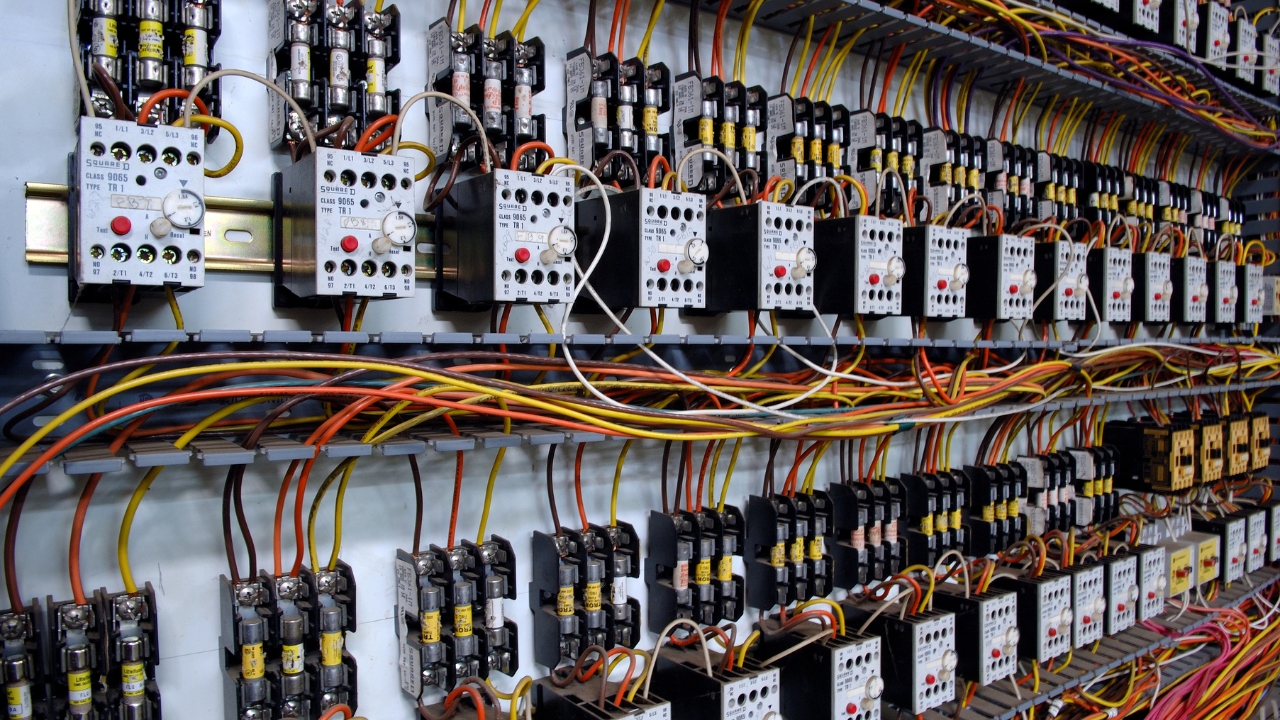
Fully Insured License
Hire Contractors & Subcontractors
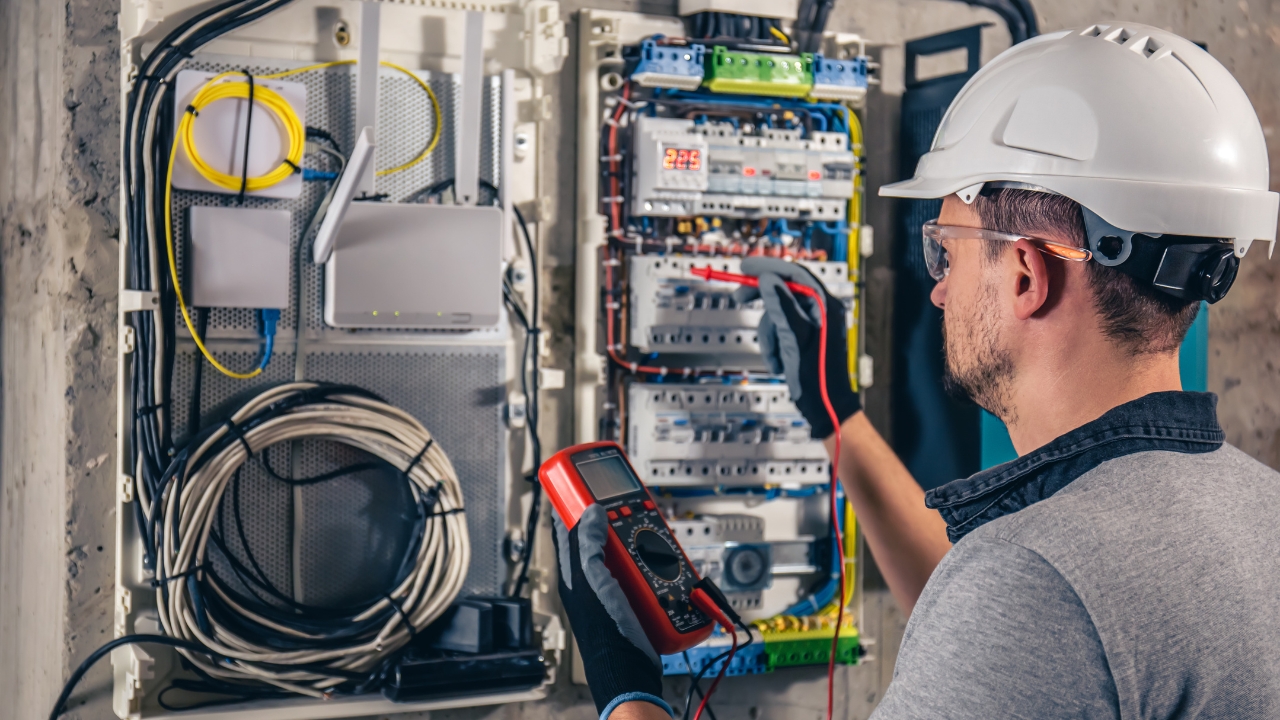
Make Informed Design Decisions Showcase Your Design Ideas
Get RenderingCall Us To Discuss More at 561-530-2845
Conclusion
When planning to rewire a 1800 sq ft home, it’s essential to consider various factors that impact the cost and process. These include the age of your home, the type of wiring currently in place, and whether there’s aluminum wiring. On average, homeowners might expect to budget a significant amount for such a project, considering the size of the house and the complexity involved. Rewiring not only enhances electrical safety and efficiency but also adds value to your property. Understanding the need for rewiring, the costs involved, and the benefits it brings is crucial in making an informed decision for your home’s electrical health and safety.
FAQs:
The cost to rewire a 1800 sq ft home can vary widely, but typically ranges from $6,000 to $12,000. This estimate depends on factors like the age of your home, the complexity of the rewiring job, the type of wiring used, and local labor rates.
Key factors that affect rewiring costs include the size of the home, the age and condition of the existing electrical system, the type of wiring materials selected, the number of electrical outlets and fixtures, and regional labor rates.
Yes, rewiring is often necessary, especially in older homes. It ensures electrical safety, prevents potential hazards like fires or shocks, and can accommodate modern electrical appliances and technology.
Cost reduction can be challenging due to safety standards, but you can save by comparing quotes from different electricians, opting for standard materials, or doing some preparatory work yourself, like clearing access areas. However, the actual electrical work should always be done by a licensed professional.
The time required to rewire a 1800 sq ft home typically ranges from a few days to a couple of weeks. The duration depends on the complexity of the rewiring, the structure of the house, and the efficiency of the electricians working on the project.
Process To Get Budget For Rewiring a 1800 sq ft Home Estimate Report
Here I am going to share some steps to get your estimate report.
-
You need to send your plan to us.
You can send us your plan on info@estimatorflorida.com
-
You receive a quote for your project.
Before starting your project, we send you a quote for your service. That quote will have detailed information about your project. Here you will get information about the size, difficulty, complexity and bid date when determining pricing.
-
Get Estimate Report
Our team will takeoff and estimate your project. When we deliver you’ll receive a PDF and an Excel file of your estimate. We can also offer construction lead generation services for the jobs you’d like to pursue further.
Google Reviews






